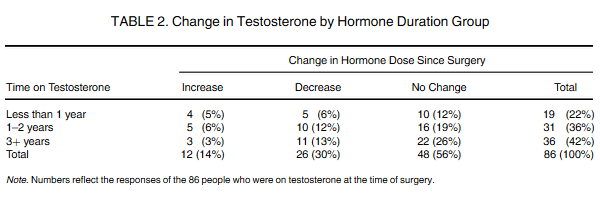FTM Hysterectomy Frequently Asked Questions
Pre-Op
I'm a minor. Can I get a hysterectomy done?
Maybe. Because this surgery eliminates the ability to reproduce, many surgeons require patients be at least 21 years of age. However, if you are experiencing symptoms such as pain or heavy bleeding hysterectomy may be medically indicated.
Is hysterectomy a required surgery for trans men who are on Testosterone?
No, hysterectomy is not required. It is not yet known if there is a direct link between long-term Testosterone therapy and incidences of PCOS and ovarian cancer among trans men. In the absence of this definitive information, combined with the difficulties many trans men experience in accessing gynecological services, some experts advocate for complete hysterectomy as part of gender-confirming therapy.
Will I need to spend a night in the hospital after hysterectomy?
Maybe, it will depend on what type of hysterectomy procedure you have and your surgeon's general practices. Many trans men who have a laparoscopic hysterectomy can go home the same day, while those who have an abdominal hysterectomy will have a short hospital stay.
Will I need to do a bowel prep before hysterectomy?
Maybe, it will depend on your surgeon's preferences.
How much pain will I be in after hysterectomy?
The level of pain that you experience will depend on the type of hysterectomy that you have and what organs are removed. Those who have laparoscopic and vaginal hysterectomies can expect moderate pain for 2-3 weeks, while Abdominal Hysterctomy is associated with longer term pain lasting 3-5 weeks, and even longer in some cases. You will be prescribed pain killers for when you leave the surgery center and go home. Many patients are able to transition to regular Tylenol within a week of surgery.
What kind of scarring will I have after hysterectomy?
The scarring you will have after hysterectomy will depend on the type of hysterectomy that you have.
- Vaginal Hysterectomy: No visible scars.
- Minimally invasive laparoscopic procedures: 2-5 small incisions; scarring is very minimal.
- Abdominal Hysterectomy: Long scar on abdomen.
Over time, hysterectomy scars will usually fade but the skin will never look exactly the same. You can improve the appearance of hysterectomy scars by using a silicone scar gel.
Does removal of the cervix lead to prolapse of the bladder, vagina, or rectum?
No. Comparison trials have shown that removing the cervix does not increase the rate of prolapse of the bladder, rectum, or vagina. Further, the studies clearly showed no increase or decrease in complications, recovery time, or readmission to the hospital, whether or not the cervix was removed. There are no medical or sexual advantages to keeping the cervix in place.
Are there ways to reduce the risk of vaginal prolapse?
Before hysterectomy surgery the bladder, urethra, vagina and uterus are all attached to the pelvic walls by a system of connective tissue called the endopelvic fascia. When the uterus is removed an element of this supportive structure is also removed. Suturing the cardinal and uterosacral ligaments to the vaginal cuff as part of hysterectomy is effective in preventing post-hysterectomy vaginal vault prolapse. Patients can also help prevent vaginal prolapse through the pelvic floor exercises, also known as Kegel exercises.
Post-Op
Should I take vitamin D and calcium supplements after hysterectomy to reduce the risk of osteoporosis?
Probably not. While doctors have long prescribed calcium supplements to prevent and treat osteoporosis, a U.S. government advisory group says doses found in dietary supplements don't prevent broken bones. They also concluded that taking 400 IU of vitamin D or less and 1,000 milligrams of calcium seems to slightly increase the risk for kidney stones.
Will I need to continue getting PAP tests after hysterectomy?
No, provided that you had a complete hysterectomy (that included removing the cervix) AND you have no history of cancerous or precancerous cervical cells. If you have a history of cervical cancer, precancerous conditions, HPV infection or immune suppression, you may need to have vaginal vault or cuff smears until you have three documented normal tests in a row. For more information, see the Trans Cervical Health Primer.
Should I lower my Testosterone dose after having a hysterectomy?
It is commonly said that trans men require less Testosterone after hysterectomy and can lower their dosage. However, this is unique to each individual and a 2010 study reported that 56% of trans men surveyed did not change their Testosterone dosage after having a hysterectomy.

When can I resume sexual activities after hysterectomy?
This will depend somewhat on the type of hysterectomy that you have but in general one should wait 6 weeks to have sex after hysterectomy. Be sure to ask your surgeon about this at your consultation.
Will my sex drive be affected by Hysterectomy?
Maybe. Here's what a 2010 study of post-hysterectomy trans men revealed:
- About half of 118 individuals (56%) who answered the question of whether or not their orgasms had changed since surgery said that there was no change.
- About one-quarter (25%) said that sexual response was better.
- 6% said that sexual response was worse.
- The remaining 11% said that it was "different" and reported more complicated experiences.
- Some respondents ascribed the different experience in their orgasm to increased comfort with their body.
When can I have a bath after hysterectomy?
This will depend somewhat on the type of hysterectomy that you have but in general one should wait 6 weeks before having a bath after hysterectomy.
Will I experience surgical menopause after hysterectomy?
Maybe. Menopause occurs when the production of estrogen and progesterone from the ovaries is ceased, either naturally or via surgical removal of the ovaries. Some trans men will experience menopausal symptoms after hysterectomy, like hot flashes, night sweats and sleep disturbance, even though the are taking Testosterone. Menopausal symptoms are uncommon when the ovaries are left in but can still occur as a result of diminished blood supply to the ovaries from the hysterectomy.